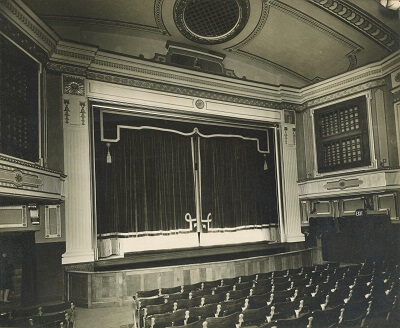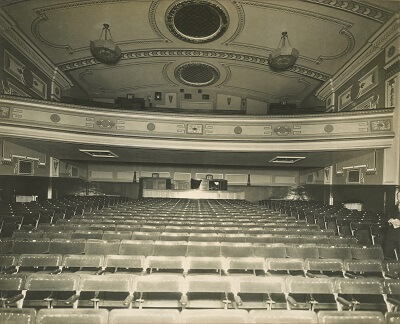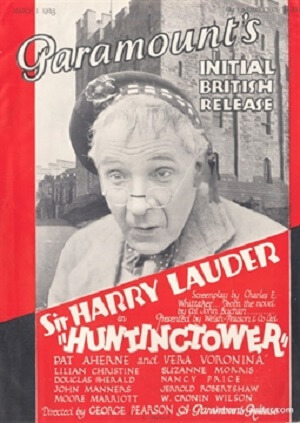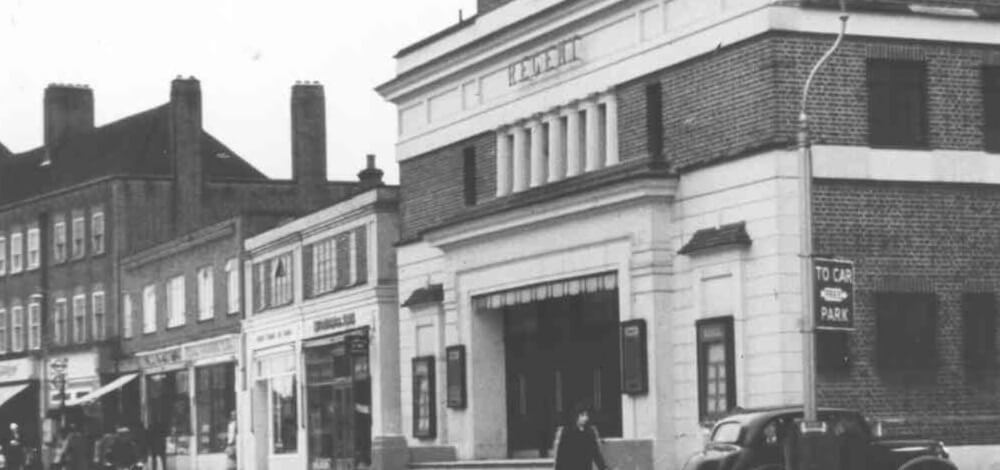by Alison Bailey March 2021
Last house for the Regent
In Amersham-on-the-Hill, 59 years ago this week, 100s of people could be seen queueing down Sycamore Road. They were waiting in line for the Regent Cinema box office to buy tickets for the Oscar winning Audrey Hepburn film, Breakfast at Tiffany’s. Although a popular film, the high demand for tickets was because the final show, on Saturday 10 March 1962, was to be the last ever screening at the cinema and everyone in the town wanted to be there.
That Saturday night police even had to be called to Sycamore Road to disperse a gang of youths who had scrawled “this cinema is to reopen” on the entrance doors after the manager, Alex Budden had refused them entrance.
As the local press reported: “The next audience will probably hustle in there to buy things for breakfast – from a supermarket.” Indeed, the fate of the Regent Cinema had been sealed the previous year when Amersham Council sanctioned the application by British Land Trust Ltd for its change of use. The owners of the Regent, Shipman & King, held only a lease on the premises and this had now expired. The handsome building was demolished soon after and replaced by the Maypole supermarket in a particularly uninspiring development.
The Fight is Lost
Audiences had been dwindling at the cinema mainly because of the competition from television and the Embassy in Chesham, which although also part of the Shipman & King circuit, usually had the latest films at least a week before the Regent. However, there was a lot of affection for the cinema in the town and a petition to save it was presented to the council soon after the closure was announced.
A last-minute reprieve seemed possible when the international theatre director and writer, Basil Ashmore, who lived at Far Corner, Stubbs Wood, campaigned to acquire the Regent for a live professional theatre. “I have all the contacts in the theatre world needed” he told the local press. “I have produced Glyndebourne Opera, and more recently the play Our Little Life with Margaret Rutherford – together with a host of others. Amersham is expanding and there is no entertainment to serve it”. Ultimately his campaign failed despite financial backing, and influential supporters like Margaret Rutherford, who lived in Gerrards Cross.
In order to replace the cinema with a supermarket, approval had to be sought from the Minister for Housing and Local Government as the Town Map showed the site as a place of entertainment. Sadly, the change of use was granted by the minister, Dr Charles Hill, who did not even have the courtesy to reply to Basil Ashmore’s correspondence. Although Hill lost his job a few months later, in Harold MacMillan’s ‘Night of the Long Knives’ reshuffle, it was too late for the Regent and for Amersham.
The First Cinema
In 1922 the musician and composer Walter Roland Croft, known professionally as Walter R Collins, opened a small cinema, the Pavilion, where Amersham Auction Rooms is today. The cinema had 150 seats and showed silent movies with a piano and percussion accompaniment. Collins’ wife, Florence, ran a busy café in the basement and it was a success. Towards the end of 1927, Collins felt that a much larger cinema could be profitably run in Amersham and bought a piece of land on Sycamore Road with the idea of building there. This was a bold and visionary investment with no guarantee of success.
The Regent

In March 1928, with local builder, Alfred Woodley, who lived at Longwood, South Road, he established Colwood (an amalgamation of both their names) Pictures and Theatres Ltd with a nominal capital of £5,500. The architect, F C Mitchell, who the following year completed the 3000 seat Savoy Theatre in Dublin, was commissioned to design the new building. This imposing picture palace built in the modern art deco style was completed just 8 months later with a steelwork frame and reinforced concrete construction. The majestic cinema had everything the modern audience desired – glitz, glamour, and spectacle. It could seat 700 people, had an orchestra pit and a 30 ft deep stage for theatrical productions. One state of the art new appliance was the “electric suction plant” to maintain the “standard of cleanliness essential to ease and comfort” in the cinema. “An asset to the locality”, it was described as “a first-class house of entertainment and comfort, far in advance of houses in many towns of larger population, and is undoubtedly one of the best equipped theatres in Bucks”.
Walter R Collins was the managing director of the new business with an annual salary of £520 pounds (around £34,000 today), working part-time, as he was not expected to give up his position as a musical editor at the publishers Ascherberg, Hopwood and Crew Ltd and other freelance activities.

Next to the cinema, with the same art deco façade, Woodley built the two storey Regent Buildings with shop fronts and living accommodation. The Croft/Collins family, which now included two daughters, Pam and Myra, and a baby boy, Barry, left White Cottage in Bois Lane, which was then occupied by Florence’s parents (and is still owned by the family) and moved into Ashcot here. The Pavilion closed to ensure the clientele moved to the new cinema and Florence opened The Regent Café in Regent Buildings. Open from 10am until 10pm the café offered morning coffee, luncheons, suppers and Thé Dansant!
The Golden Age
The opening film, which was shown Monday 3 December 1928 was the British silent movie, The Huntingtower, filmed at Cricklewood Studios and starring the Scottish comedian, Sir Harry Lauder. Continuous performance started at 6.15 with afternoon performances every Wednesday and Saturday at 2.30. The following month there was Ivor Novello in The Constant Nymph and Jacqueline Logan in an American silent horror film, The Leopard Lady.

The stage was also used for theatrical productions and concerts. In 1930 Jack Warner (later famous as Dixon of Dock Green) starred in a production of Gilbert and Sullivan’s Iolanthe, performed by the Cestreham Players. That year Colwood Pictures invested in a sound system and audiences were being invited to “see and hear the “Talkies” – “You will not be disappointed – they are absolutely “GREAT”. Ask your friends what THEY think”. One of the early “100% Talkie Productions” shown was High Treason starring Benita Hume and Jameson Thomas, a science fiction drama set in a futuristic America. Advertised as “the Finest Cinema in Bucks”, the audience were invited to “get the Regent Habit”.
In the first year of operating, the Regent declared a profit of £1,473 (c £96,000 today) but the relationship between the two directors was soon in serious difficulties. In 1929 Alfred Woodley had built a second cinema, the Rivoli at Ruislip, to the same design as the Regent, without consulting Collins, who believed that the invoices presented to the company were excessive. Collins accused Woodley of taking advantage of his lack of business experience. In turn, Woodley felt that Collins was distracted by his other musical commitments and was not devoting enough time to the business. The relationship ended after an acrimonious court case, November 1930, in the Chancery Division of the High Court. Collins went on to have a successful career composing light entertainment dance music and conducting. After the split with Woodley, the Collins/Croft family lived in Wembley Park before moving to Bexhill-on-Sea. For the last 20 years of his life, Collins was the musical director at the De La Warr Pavilion in Bexhill-on-Sea. After Collins died Florence returned to live at White Cottage until her death in 1971 and both are buried in Chesham Bois Burial Ground.
The Amersham Waxworks?
Alfred Woodley’s building business continued to expand, and he later became chairman of Amersham Council. However, he continued to have an interest in the entertainment industry. In 1931 he formed a company, General Exhibits Ltd “to carry on business as proprietors and producers of exhibitions of waxworks”. His fellow directors were Hugh Conrad Tussaud (the great great-grandson of Marie Tussaud) of Khama, Vache Lane, modeller and J F Wege, Dunkerry, Hill Avenue, dental surgeon. Were they planning to open a waxwork display in Amersham and what happened?
Shipman & King
In early 1931 Shipman & King Cinemas Ltd bought the Sycamore Road lease and added the Regent to their growing circuit of cinemas. Alf Shipman and Samuel King specialised in buying existing cinemas in small prosperous towns in the South of England, refurbishing them if necessary, and then building more nearby. In 1937 they built the Embassy in Chesham and in 1938 the Rex in Berkhamsted, which is one of only four surviving Shipman & King cinemas. In Amersham they introduced a Western Electric sound system in their first year, and in 1935, a wide screen.
Heart of the town
Until its closure in 1962 The Regent Cinema was central to life in Amersham with Remembrance Services, Royal Wedding screenings and Gala fundraising concerts held there. Most families knew someone who worked at the Regent, in the box office, in the chocolate kiosk, or as an usherette, projectionist or cleaner. In 1955 visitors were treated to an exhibition of Dirk Bogarde’s suits in the foyer. Made by local tailors, Nancarrow and Temple the suits and uniforms on display had featured in the film Doctor at Sea. The film star and heart throb, Dirk Bogarde, elected “Star of the Year” in 1955, was one of the most famous British actors at the time. He was of particular interest in the town as he was living locally and had just bought Beel House in Little Chalfont.
With many thanks to Dick Ellis whose 1928 photo of the local workers who built the Regent inspired this research. Please contact us if you have further information or memories of Amersham’s lost cinema, particularly if you can remember the colour of the interior or the staff uniforms (which we believe were dark red).
Click on this link for Memories of The Regent Cinema by David James
Sources
Amersham Auction Rooms – Buying at Auction
British Newspaper Archive
SHIPMAN & KING CINEMAS ~ The Founders – Chester Cinemas
Regent Cinema in Amersham, GB – Cinema Treasures
Michael Brooks article for Amersham Society, Amershammuseum.org
Ancestry.com
Wikipedia
The Croft family

